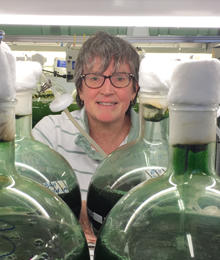An interview with Professor Linda Lawton
March 2020
Professor Linda Lawton is a Research Group Leader at Robert Gordon University in Aberdeen, and a member of the Microbiology Society. In this interview, she tells us more about her research into cyanobacteria and why she thinks microbiology matters.

Tell us more about your research.
I began my career in microbiology 40 years ago, which has shown me how important microbiology is to every aspect of our lives. For over 30 years, I have been fascinated by the fiendish antics of ancient microbes known as blue-green algae. They are in fact actually bacteria and more properly known as cyanobacteria, but the blue-green pigments they produce as they grow in water, make them very similar in appearance to true algae.
What drew you to this particular area of research?
The key reason I have been absorbed with researching these bacteria is their wonderful ability to make a range of deadly toxins, which are very harmful to animals and people alike. These microbes are some of nature's most talented chemists, producing a diverse range of chemicals, some of which may one day cure disease; however, the molecules which excite me the most are the deadliest. Cyanobacteria forms blooms in nutrient-rich water, giving the appearance of thick spilled paint, and while this affects water quality alone, they also often produce toxins (cyanotoxins).
I have spent many years putting my microbiology skills to work, in order to fully understand these microbes and the toxins they produce. Growing toxic cyanobacterial isolates in the lab has allowed me to isolate these potent compounds (especially microcystins) and develop robust analytical methods to allow water quality scientists to quantify these toxins in lake water and drinking water. This has also allowed me to investigate new, exciting methods to destroy the toxins before they cause harm.
Why is your research important?
By exploiting other bacteria which live in water, I have shown that toxins can be biodegraded to remove their toxicity. Using this approach, I am developing water treatment systems, using selected microbial communities that degrade toxins and could even attack live cyanobacterial cells, for use in Sri Lanka in drinking water wells.
Why is being a member of an organisation like the Microbiology Society important?
The Microbiology Society has been central to the development of this important work by funding for two workshops, to train researchers in Sri Lanka. Through the support of the Microbiology Society, our collaborators were able to develop their skills to detect the cyanobacterial toxins which has highlighted human toxin exposure and a potential link to kidney disease.
Are there any challenges you face in your role?
One of the ongoing challenges I face, is the question that has been asked since I first started working in this field: “why do cyanobacteria produce these toxins?” To be honest, I still think we are a long way off answering this question, but at least we are making excellent progress in protecting water users from their fiendish ways!
Why does microbiology matter?
The study of microbiology is more important than ever, playing a key role in human health and climate change, bringing direct ways we can remove CO2 from the atmosphere and replace our need for chemicals from oil and gas. Another area of algal biotechnology that I am investigating is the use of algae and cyanobacteria for the production of biodegradable plastics from waste. There has never be such an exciting time to be a microbiologist and the Microbiology Society provides an excellent platform to bring us together to solve some of the biggest issues we are facing.


